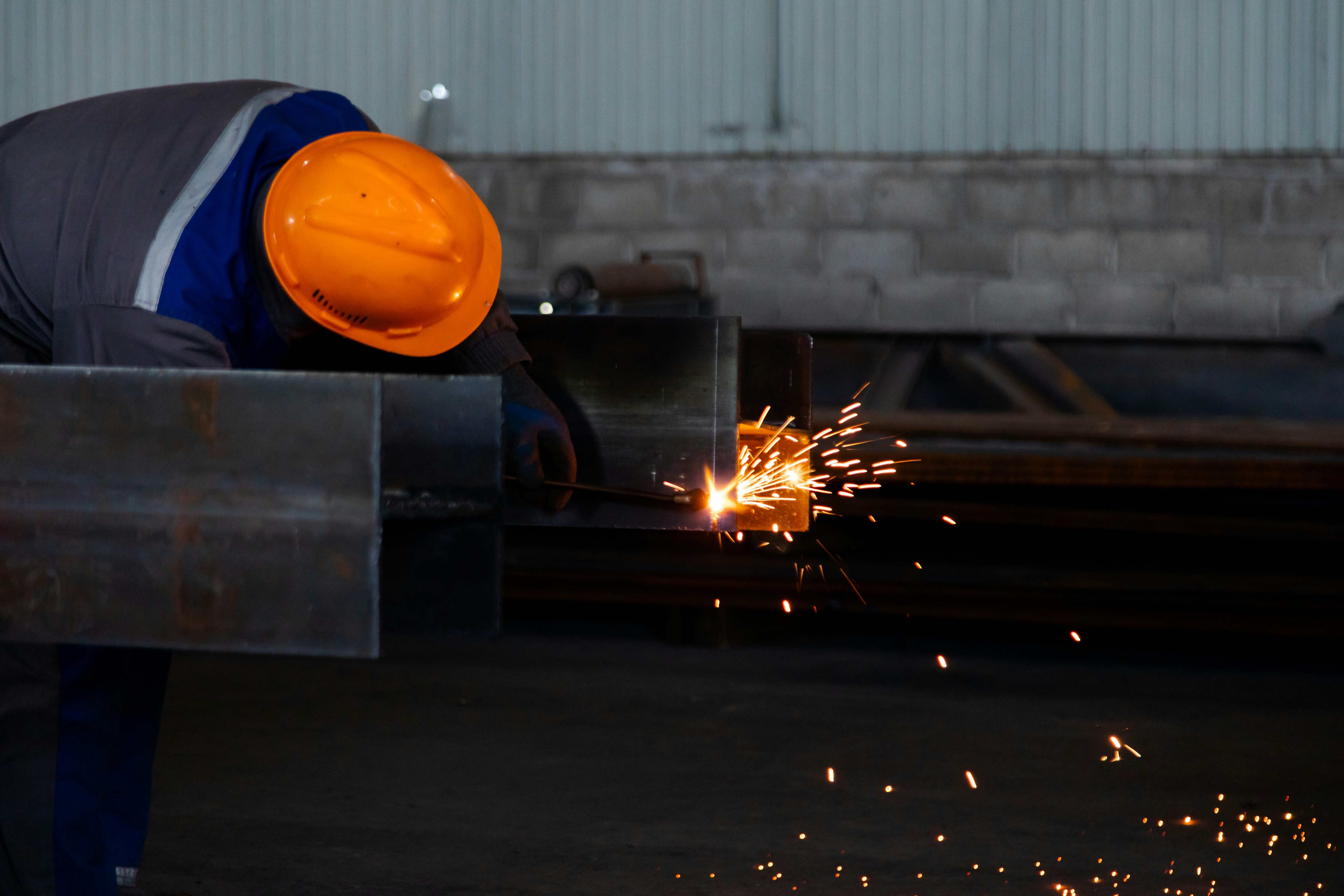The manufacturing industry is undergoing rapid transformation, with key sectors like defence, advanced manufacturing, and renewable energy experiencing remarkable growth. While this expansion unlocks exciting new opportunities, it also brings pressing challenges, particularly in attracting and retaining skilled talent. As these industries progress, the demand for skilled professionals continues to rise, making effective recruitment essential to meet industry needs, bridge critical skill gaps, and maintain competitiveness in a fast-paced market.
In this guide, we explore the key growing sectors within the manufacturing industry, highlight key technologies, and explain the reasons for expansion. We will also address the great demand for specialised talent and provide effective strategies for attracting and retaining professionals.
What are The Growing Sectors in Manufacturing?
The number of businesses in the manufacturing industry is expected to reach 132,900 by 2024, with a compound annual growth rate (CAGR) of 1.46% from 2024 to 2029. This figure highlights the industry's rapid growth. As various manufacturing sectors grow, the demand for specialised talent will increase.
With that in mind, here are the key growing sectors within the manufacturing industry:
1. Advanced Manufacturing
Advanced manufacturing represents a transformative approach to production. With new cutting-edge technologies, this sector is a key player in the growth of the manufacturing industry. Automation and digitalisation are becoming more prevalent and are crucial contributors to rapid growth.
Reasons for Sector Growth
The reasons for growth within advanced manufacturing are as follows:
- Technical Innovation - The adoption and investment in robotics, 3D printing, and smart factories have increased massively. Quicker manufacturing processes are advancing the sector's capabilities.
- Demand for Customisation - Advanced manufacturing allows for higher product customisation and personalisation levels. Customisation capabilities meet the growing consumer demand.
- Improved Efficiency - Automation and digital tools help optimise product schedules, reduce waste, and enhance operational efficiency. Advanced technologies can streamline workflows and provide real-time data insights, optimising resource management.
- Competitive Advantage - Companies investing in advanced manufacturing technologies gain a competitive edge. Advanced manufacturing businesses can position themselves as industry innovators and continue to enhance their market standing.
2. Renewable Manufacturing
Next is renewable manufacturing. Recent research shows that the energy sector and supply chain generate around £149 billion in economic activity. Renewable energy manufacturing is undoubtedly at the forefront of driving sustainability. Focused on developing components for renewable energy sources such as solar and wind, the sector is paramount for the success of the overall industry.
Reasons for Sector Growth
Below are the fundamental reasons for the sector growth of renewable manufacturing:
- Global Climate Initiatives - International climate agreements and national commitments to reducing carbon emissions have spurred a substantial increase in demand for renewable energy technologies.
- Government Incentives and Policies - Governments offer subsidies, tax breaks, and favourable policies. So, businesses are encouraged to adopt renewable energy. Ultimately, this enhances the manufacturing of solar, wind, and storage components.
- Technological Advancements - Continuous innovation in solar, wind, and energy storage technologies makes renewable energy more efficient and cost-effective, driving wider manufacturing.
- Corporate Sustainability Goals - Businesses are increasingly adopting renewable energy to meet sustainability targets, driving demand for manufactured renewable energy products.
- Rising Consumer Demand - Growing public awareness of climate change is increasing consumer demand for clean energy solutions. Businesses are beginning to feel pressure from both governments and companies to invest in renewable energy manufacturing.
3. Aerospace and Defence Manufacturing
The aerospace and defence manufacturing sector plays a crucial role in advancing commercial and military technologies. With a focus on producing aircraft, spacecraft, and defence systems, the sector is driven by international security concerns and space exploration.
Institutions like the Advanced Manufacturing Research Centre (AMRC) are a testament to the soaring market. They specialise in many sectors, particularly aerospace and space. AMRC have over 20 years of experience in aerospace R&D and is at the forefront of innovation for space exploration.
Defence manufacturing isn’t limited to the air. Sheffield Forgemasters supplies cast and forged steel components for several submarine platforms. With over 200 years of experience, they have developed a range of capabilities, encompassing valve bodies to 22-metre shafts.
Reasons for Sector Growth
Here are the underlying causes for sector growth:
- Rising Air Travel Demand - The increasing need for commercial aircraft due to global travel demand and expanding airlines supports growth in aerospace manufacturing.
- Space Exploration and Satellite Demand - Expanding space missions, satellite launches, and private sector involvement in space exploration drive investment in the aerospace sector.
- National Defence Investments - Governments are increasing defence spending to enhance national security, leading to higher demand for military aircraft, drones, and advanced defence technologies.
- Technological Advancements - Continuous innovation in avionics, materials, and aerospace systems contributes to more efficient and advanced aircraft and defence products.
4. Biotechnology and Pharmaceutical Manufacturing
Biotechnology and Pharmaceutical manufacturing are essential in supporting healthcare delivery. This sector produces life-saving drugs, therapies, and medical devices. With a growing ageing population and medical technology advancements, the demand for this sector's manufacturing is high.
Reasons for Sector Growth
There are many reasons for sector growth in biotechnology and pharmaceutical manufacturing. Take a look at the following:
- Ageing Population - A rising elderly population increases the demand for medical products and therapies for age-related conditions.
- Scientific and Medical Breakthroughs - Advances in biotechnology, genomics, and personalised medicine create new treatment options, driving demand for specialised manufacturing.
- Government and Private Investment - Significant investments in research and development from both the government and private sectors enhance growth. Subsequently, this leads to innovation in drug manufacturing and biotechnology.
- Pandemic Preparedness and Healthcare Needs - The COVID-19 pandemic increased awareness of the importance of rapid pharmaceutical production. Now, continued investment in medical manufacturing capabilities is still evident.
5. Food and Drink Manufacturing
Recent research suggests that food and drink manufacturers directly employ around 450,00 people across every region and nation of the UK. This sector must continuously adapt to changing consumer preferences, with an emphasis on health and sustainability. As consumer preferences change, employment rates increase.
Reasons for Sector Growth
Here, we explore why the food and drink manufacturing sector is growing:
- Rising Health Consciousness - Consumers demand healthier, organic, and sustainable food products, driving innovation and growth in food manufacturing.
- Urbanisation and Population Growth - Expanding urban populations create higher demand for processed foods, leading to the growth of large-scale food production.
- Sustainability Focus - A shift toward sustainable packaging and eco-friendly production aligns with consumer preferences, promoting growth in environmentally conscious food and drink manufacturing.
- Innovation in Food Products - The development of plant-based foods, alternative proteins, and convenience meals is driving innovation and attracting new market segments.
Strategies for Attracting Top Manufacturing Talent
https://www.oracle.com/uk/industrial-manufacturing/industrial-manufacturing-trends/
The UK economy is beginning to recover from the challenges experienced at the end of 2023. While growth is projected to be modest, an additional 251,500 construction workers will be needed by 2028 to meet the demand for projects.
Below are four key strategies for helping manufacturing companies stay competitive and bridge skill gaps in construction recruitment.
1. Rebranding Manufacturing
To overcome outdated perceptions and attract new talent, manufacturing companies need to rebrand themselves as modern and innovative.
Key actions include:
- Modernise Industry Image - Highlight advancements in automation, robotics, and sustainable practices to promote jobs in manufacturing as innovative careers.
- Promote Success Stories - Sharing examples of employees who have built successful careers in manufacturing is crucial. Demonstrating the potential for rewarding careers will attract the best manufacturing talent.
- Engage in Community Outreach - Partnering with educational institutions should not be understated. Accessing potential talent and ensuring an active social media presence are great ways to reposition manufacturing as an attractive career choice.
2. Targeted Recruitment
In a competitive job market, a strong strategic approach to construction recruitment is essential. By targeting specific talent pools, manufacturers can better connect with potential candidates.
Consider the following strategies:
- Identify Talent Pools - Use data-driven insights to identify the needs and preferences of different groups, such as recent graduates and experienced professionals.
- Specialised Recruitment - Working with industry-specific recruitment agencies is invaluable. Agencies provide unmatched support in sourcing and attracting talent. To find the best opportunities, attending specialised job fairs also means you can reach the best candidates.
- Create Tailored Campaigns - Make sure your business has created recruitment campaigns that resonate with the unique values and preferences of your target talent pools.
3. Competitive Offers
Manufacturing companies must provide more than just a good salary to improve talent acquisition. Competitive compensation packages that address broader employee needs are crucial.
Strategies include:
- Compensation Packages - Candidates are always looking for the benefits of working at your company. So, offering competitive wages, healthcare, retirement plans, and work-life balance initiatives to make your company more appealing.
- Flexible Work Options - Offer flexible schedules and remote work opportunities where applicable to appeal to a wider range of candidates and widen potential talent pools.
- Performance-Based Incentives - Professionals are always thinking about how they can progress. Provide bonuses, clear opportunities for salary progression, and regular benchmarking against industry standards to promote employee recognition and satisfaction.
4. Career Path Promotion
Offering clear and well-defined career paths is one of the most effective ways to attract and retain manufacturing talent.
Manufacturing companies should focus on the following:
- Transparent Career Progression - As mentioned briefly, developing clear career frameworks that outline the skills and milestones needed for advancement is essential.
- Continuous Learning Opportunities - Offer training programs, mentorship, and leadership development to support employee growth and appeal to candidates who prioritise continuous learning.
- Long-Term Investment in Employees - If you want your business to stand out, you can demonstrate your commitment to employees' professional growth by offering paid, long-term training programs to support career growth.
Final Word: Attracting Talent for Growing Manufacturing Jobs
The manufacturing industry is undergoing significant change, driven by rapid growth in sectors such as advanced manufacturing, renewable energy, and biotechnology. As these sectors expand, the demand for skilled talent to fill manufacturing jobs intensifies. Subsequently, companies must implement effective recruitment and retention strategies.
To stay competitive, companies should rebrand the manufacturing industry as an innovative field. Targeted recruitment efforts are also essential in appealing to specific talent pools. Offering competitive compensation packages and clear career progression opportunities are also essential strategies to attract and retain skilled professionals.
As we explore the industry's growing sectors and the demand for jobs in manufacturing, it's clear that attracting top talent is more important than ever. By using these strategies, businesses can ensure they are prepared to capitalise on the opportunities presented by the industry.
Specialists in International Manufacturing Recruitment
Manufacturing jobs have risen due to significant growth across various sectors within the industry. W Talent’s expert team sources high-quality candidates using a people-centric approach that is tailored to your needs.
Whether you’re a startup or a well-established company in the manufacturing industry, our experience and services offer unmatched solutions.
Contact us today to discover how we can help you take your business to the next level.





